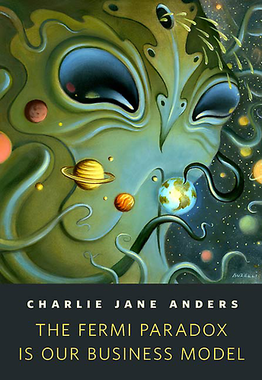
Cory Efram Doctorow is a Canadian-British blogger, journalist, and science fiction author who served as co-editor of the blog Boing Boing. He is an activist in favour of liberalising copyright laws and a proponent of the Creative Commons organization, using some of its licences for his books. Some common themes of his work include digital rights management, file sharing, and post-scarcity economics.

Rudolf von Bitter Rucker is an American mathematician, computer scientist, science fiction author, and one of the founders of the cyberpunk literary movement. The author of both fiction and non-fiction, he is best known for the novels in the Ware Tetralogy, the first two of which both won Philip K. Dick Awards. He edited the science fiction webzine Flurb until its closure in 2014.
Boing Boing is a website, first established as a zine in 1988, later becoming a group blog. Common topics and themes include technology, futurism, science fiction, gadgets, intellectual property, Disney, and left-wing politics. It twice won the Bloggies for Weblog of the Year, in 2004 and 2005. The editors are Mark Frauenfelder, David Pescovitz, Carla Sinclair, and Rob Beschizza, and the publisher is Jason Weisberger.

Ian McDonald is a British science fiction novelist, living in Belfast. His themes include nanotechnology, postcyberpunk settings, and the impact of rapid social and technological change on non-Western societies.

Peter Watts is a Canadian science fiction author. He specializes in hard science fiction. He earned a Ph.D from the University of British Columbia in 1991 from the Department of Zoology and Resource Ecology. He went on to hold several academic research and teaching positions, and worked as a marine-mammal biologist. He began publishing fiction around the time he finished graduate school.

Black Gate is a fantasy magazine published by New Epoch Press. It was published in glossy print until 2011, after which it shifted online.

Mundane science fiction (MSF) is a niche literary movement within science fiction that developed in the early 2000s, with principles codified by the "Mundane Manifesto" in 2004, signed by author Geoff Ryman and "The Clarion West 2004 Class". The movement proposes "mundane science fiction" as its own subgenre of science fiction, typically characterized by its setting on Earth or within the Solar System; a lack of interstellar travel, intergalactic travel or human contact with extraterrestrials; and a believable use of technology and science as it exists at the time the story is written or a plausible extension of existing technology. There is debate over the boundaries of MSF and over which works can be considered canonical. Rudy Rucker has noted MSF's similarities to hard science fiction and Ritch Calvin has pointed out MSF's similarities to cyberpunk. Some commentators have identified science fiction films and television series which embody the MSF ethos of near-future realism.

Charlie Jane Anders is an American writer. She has written several novels as well as shorter fiction, published magazines and websites, and hosted podcasts. In 2005, she received the Lambda Literary Award for work in the transgender category, and in 2009, the Emperor Norton Award. Her 2011 novelette Six Months, Three Days won the 2012 Hugo and was a finalist for the Nebula and Theodore Sturgeon Awards. Her 2016 novel All the Birds in the Sky was listed No. 5 on Time magazine's "Top 10 Novels" of 2016, won the 2017 Nebula Award for Best Novel, the 2017 Crawford Award, and the 2017 Locus Award for Best Fantasy Novel; it was also a finalist for the 2017 Hugo Award for Best Novel.

Flurb was an American science fiction webzine, edited by author Rudy Rucker and launched in August 2006. In addition to short stories, Flurb featured paintings and photography by Rucker. It was released biannually. The author of an accepted story retained full copyright, including the right to have the story published elsewhere, and to request that it be taken down at any time.

Saturn's Children is a 2008 science fiction novel by British author Charles Stross. Stross called it "a space opera and late-period [Robert A.] Heinlein tribute", specifically to Heinlein's 1982 novel Friday.
Samantha Henderson is an American science fiction and fantasy writer and poet.
"Source Decay" is a science fiction short story by Charlie Jane Anders. It was first published in the online magazine Strange Horizons January 3, 2011.
"Colliding Branes" is a science fiction short story by Rudy Rucker and Bruce Sterling. It was first published in the February 2009 issue of Asimov's Science Fiction.

"The Fermi Paradox Is Our Business Model" is a science fiction short story by American writer Charlie Jane Anders. It was first published in the online magazine Tor.com August 11, 2010.

Postsingular is a 2007 science-fiction novel written by the American writer Rudy Rucker. It focuses upon a cast of San Franciscans and their relationship with emerging uses of nanotechnology. It was the first of his works to be licensed under a Creative Commons license and released to the public on the Internet.
Project Hieroglyph is an initiative to create science fiction in order to spur innovation in science and technology founded by Neal Stephenson in 2011.
Gregory Norman Bossert is an American writer and filmmaker. He has won the World Fantasy Award and is a finalist for the Sturgeon Award. He lives in Marin County, California, and works at Industrial Light & Magic.
List of works by or about the British author Ian McDonald.
List of works by or about Karl Schroeder, Canadian author.
"Jackalope Wives" is a 2014 fantasy short story by Ursula Vernon, combining the legends of the swan maiden and the jackalope. It was first published in Apex Magazine and has been reprinted in the collection Jackalope Wives and Other Stories. One of the characters, Grandma Harken, is the protagonist of another award-winning story by Vernon, "The Tomato Thief."











